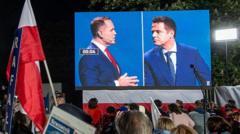Amid a backdrop of political divide, Poland readies itself for a significant presidential election that could redefine its trajectory and governance landscape.
Poland on the Brink: Presidential Election Promises a Clash of Ideologies

Poland on the Brink: Presidential Election Promises a Clash of Ideologies
Poles prepare for a pivotal presidential election, with fresh faces and old rivalries shaping the future.
As Poland approaches its presidential election, set for Sunday, contenders Rafal Trzaskowski and Karol Nawrocki are leading the charge among 13 candidates. Trzaskowski, the liberal mayor of Warsaw, and Nawrocki, a historian representing the national-conservative Law and Justice (PiS) party, are expected to face off in a potential run-off on June 1. This upcoming vote carries immense weight, as the president holds the power to veto legislative bills, complicating matters for the ruling coalition led by Prime Minister Donald Tusk, who recently reclaimed power after years of PiS-led governance.
Opinion polls indicate the likelihood of a second round, as neither Trzaskowski nor Nawrocki is projected to secure over 50% in the first round. Tusk's Civic Platform (PO) party and PiS have shared dominance in Polish politics for nearly 20 years, a scenario many voters find unsatisfactory. Observers view Tusk's return to power as a potential restoration of liberal democracy, though criticisms have emerged regarding his administration's own handling of contentious issues, including media control and immigration policy.
Tensions escalated during the campaign as Nawrocki leveraged nationalist sentiments, simultaneously attempting to corner Trzaskowski on LGBTQ+ rights. The sharp ideological divide underscores a broader concern among voters who claim they see little difference between the contrasting populisms of both parties. Environmental and social issues, such as women’s rights and migration, appear sidelined as security concerns become central following current geopolitical tensions.
Accusations surrounding Nawrocki's financial dealings with a pensioner, who he allegedly bought a flat from at a steep discount, have not notably impacted his standing in the polls. His supporters believe he is a trustworthy candidate for preserving Polish interests within the EU. Meanwhile, discontent with the political duopoly increases among citizens, as evidenced by the rise of fringe candidates who struggle to break through despite public fatigue.
As the election looms, many voters, like psychotherapist Aleksandra Januszewicz, express frustration with the dichotomy of choices, yearning for political dialogue and genuine representation that transcends the entrenched power struggles. The political landscape remains fractured, but a pivotal election may hold the key to a new direction for Poland moving forward.

















